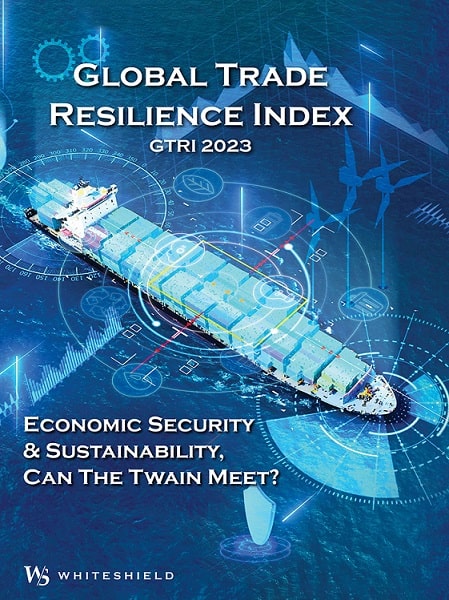- The largest trading countries exhibit higher resilience to trade shocks
- Germany, the Netherlands and the United States are the top 3 performers, respectively
- UAE, Qatar, Saudi Arabia and Morocco amongst the top 50 performers
- UAE ranksed 1st among Arab countries1 and in 31st position globally
Dubai, United Arab Emirates-
With over ten years at the forefront of trade and sustainability, Whiteshield proudly introduced its first Global Trade Resilience Index (GTRI 2023) on December 7 on the sidelines of COP28. The inaugural event gathered esteemed government officials, influential figures from international and regional bodies, distinguished academics, and leading private sector voices.
In response to the growing discussions surrounding global trade policy issues and their role in supporting the transition to greener economies, Whiteshield has pioneered an innovative approach to reflect the current state of trade relationships, by product and by partner.
Whiteshield has developed a unique methodology to gauge countries’ capacity to absorb trade shocks in the short term and recover in the medium term. As their goal is to assist countries in achieving their sustainable development objectives by identifying areas for improvement across our 58 GTRI indicators, covering 136 economies.
The top 10 GTRI performers include nine high-income countries (Germany 1st, Netherlands 2nd, USA 3rd, France 4th, Japan 5th, UK 6th, Italy 7th, Singapore 8th, Belgium 10th) and only one upper-middle-income (China 9th). Other upper-middle-income countries that ranked high include Malaysia (20th) and Thailand (22nd).
Germany, the world’s 3rd largest exporter tops the GTRI rankings on account of the strong trade networks it has weaved across the world throughout the years, and also due to its highly diversified trade both in terms of products and trade partners. The Netherlands is the world’s sixth largest trading nation and ranks second in the GTRI owing to its strong links to Europe and the rest of the world, advanced logistics and distribution systems, and its business-friendly environment.
The third top performer in the GTRI is the United States, the second largest trading nation in the world. The US high rank reflects, among others, the strengths of its global trade network, its role as a major global trading hub as well as the diversified and complex goods it trades in. China, despite the fact of being the world’s top exporting country and the world factory is ranked only 9th in the GTRI owing to a strong capacity to absorb shocks (China plays a major role in the global supply chains with a diversified portfolios of goods and trading partners) but relative weaknesses in its institutional pillar.
The United Arab Emirates (UAE) is the top performer among Arab countries and 31st globally owing to its role as a major global trading hub, its business-friendly environment, highly diversified trade partners, world class infrastructure, and high quality logistics and customs capacity. Areas for improvement include enhancing product diversification and moving up the value chain to trade in complex products.
The Kingdom of Saudi Arabia is the 3rd top performer among Arab countries and 47th globally, reaping the benefits from accelerated economic diversification plans and supporting policies. Institutional, financial and regulatory reforms have resulted in major improvements in the business environment and high growth rates in travel, tourism, logistics and fintech sectors. The Kingdom has managed to expand its trading partners beyond its traditional markets; however, while its trade diversification in goods is improving, it has yet to fully reach its full potential. Areas for improvement include facilitation of border measures and stronger law protection.
Fadi Farra, Senior Managing Partner at Whiteshield, said: “In light of the growing discussions around global trade policy issues and their role in supporting the greening of our economies, Whiteshield has pioneered the Global Trade Resilience Index 2023 which presents a novel approach to support countries in identifying areas to improve both their absorptive and recovery capacities to trade shocks. Our goal is to contribute to the success of COP28 and in particular where trade and complementary policies can help drive both climate and sustainable development actions.
Raed Safadi, Whiteshield’s Chief Economist, said: “The GTRI is published at a time when severe disruptions to global markets have undermined trade resilience. While approaches to “near shoring” or “friend shoring” can increase resilience to geo-political risks in the short term, they make countries less resilient to other types of shocks such as the recent COVID-19 pandemic. Whiteshield has developed the GTRI to support countries in enhancing their trade integration while minimising the impact of shocks on their economies. The report is a tool that helps to unlock trade resilience by incorporating innovative methods rooted in the network theory, embedding simulations of trade shocks and tracing their potential impact on trade flows.”




